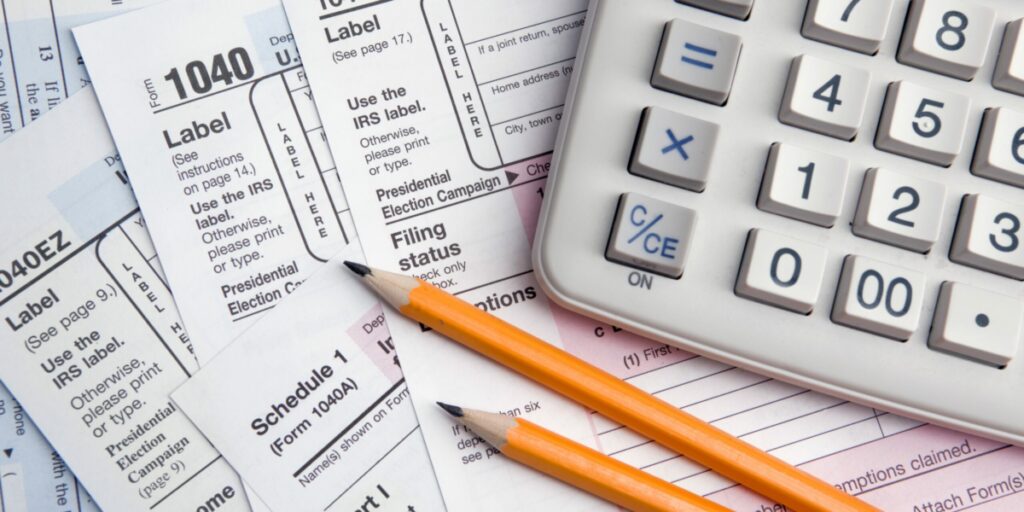Everything you need to know about filing US Federal Taxes as an American Expat living abroad

Disclaimer: I am not a tax expert, nor a lawyer. All information in this post is from my research on this topic. All opinions in this post are my own from my experiences and said research. I just like sharing my knowledge of what I’ve gleaned from every corner of the web with you so you won’t have to.
This is NOT a sponsored post.
If you have any questions, please reach out to a professional. They are there for a reason.
There are many things about living abroad that one may think they no longer need to do, but did you know that as an American living abroad you still need to file taxes? Yes, you read the right. If you’re an American and you have moved and set up life abroad, you will need to file your taxes. Now, this does not necessarily mean you will need to pay taxes (unless you meet certain requirements), but you still need to file them. That’s why I’m sharing what I’ve learned about filling US federal taxes as an American living abroad.
I’m sharing with you all my research and time spent on this subject so you don’t have to bang your head about it. It can be intimidating and overwhelming, but it doesn’t need to. As long as you’ve armed yourself with the right knowledge and a good expat tax service (you’ll see my favorite below), you will have nothing to worry about.
Table of Contents
Do you need to file taxes as an American living abroad?
The short answer is yes.
The United States is one of only 2 countries that have a citizenship-based taxation system. If you are unsure whether you need to file or not, MyExpatTaxes has a handy calculator that will help you figure that out. Now, there is a difference between filing and paying taxes abroad. I’m going to mainly focus on filing taxes abroad as an American citizen.
First things first, when it comes to being an American expat and living abroad and taxes, you need to understand what FBAR and FATCA are and how they affect you. These are two acronyms that are thrown around in conjunction with filing taxes as an American expat. The IRS tracks foreign assets in two different ways: FBAR and FATCA.
What IS FBAR? FATCA?
These two may sound similar, but are actually different in what information is reported and who it is reported to.
FBAR is the Foreign Bank Account Reporting that is only required if you, the American citizen, have $10,000.00 or more at any one point in your foreign bank accounts throughout the fiscal year. Yes, that ‘s plural. You need to report all your financial accounts, this can include, but is not limited to bank accounts, mutual funds, bonds, stock, and any foreign life insurance account.
It wasn’t until recently that the IRS started to crack down on reporting on all fronts. So, do you need to report if you don’t have $10,000.00 at any one point in your account? That answer is a little unclear. From what I was able to understand, this can go either way. Here’s what the IRS has to say about FBAR.
FBAR is due on the 15th of April and you are granted an automatic extension until the 15th of October if you do not meet the April deadline, there is no need to request an extension. You can file your FBAR here.
FATCA is the Foreign Account Tax Compliant Act that combats offshore tax evasion by requiring foreign financial institutions to report directly to the IRS information on any persons that are American citizens that have foreign accounts. This goes beyond just simple bank accounts, this is a combination of all of your financial assets. You can find a list of foreign assets here from the IRS. You’ll need to file FATCA if your combined foreign assets are of equal or greater value to $50,000.00. (more information here from the IRS.)
Here’s where you can download form 8938 to file for FATCA.
Where to go to get help.
You do not need to go at it alone. A simple Google search will turn up lots of suggestions on tax filing services! There are many avenues you can take in this route. There’s always the free-to-file route offered by the IRS. If you start here, make sure your situation fits into what they allow/offer. I have filed my taxes myself ever since I’ve needed to file them. When moving abroad, I knew that I needed to continue to file them so I set out to look for a service that would take care of all my needs in one go-around. I follow a couple expat tax service already, but decided to go with MyExpatTaxes. Here are some other services that are available for expats that also piqued my interest:
Depending on what you’re doing/what your needs are, depends on how much help you require for filing your taxes. I liked all of these services, but decided to go with MyExpatTaxes because they best fit my need at the time when filing.
So how does it work and what's required?
Filing your taxes abroad does not need to be scary. It’s just the same as if you were filing taxes back in the States. Below are the thresholds for filing your 2022 tax return. If you’re like me, I’ll be filing as married filing separately again this year for my US taxes. My threshold is $5.00 (which has remained unchanged). Since I am a full-time working employee in France, and I have made more than the equivalent to $5.00, I will need to file a US tax form. But that does not necessarily mean I will owe taxes on these files.
Income, whether foreign earned or national earned, are taxed on the same rates. Here’s the following thresholds for 2022:
- Filing single: under 65: $12,950.00; over 65: $14,700.00.
- Filing married, jointly: both spouses are under age 65: $25,900; one spouse is under 65 and one is over 65: $27,300; both spouses are 65 or older: $28,700
- Filing as Married Filing Separately: $5.
- Filing as Self-Employed: $400.
- Filing as head of household: under 65: $19,400; 65 or older: $21,150
- For citizens as qualifying widow(er)s with dependent child: under 65: $25,900; 65 or older: $27,300
The US and France have a tax treaty set in place, meaning that residents of either nation living and working in the opposite country do not need to pay taxes to both countries. Just because there is a tax treaty does not mean that taxes do not need to be filed. This tax treaty has allowed Americans living in France to claim certain tax credits, deductions or exclusions when it comes to preparing their tax return. The following are three that are the most popular:
- Foreign Earned Income Exclusion
- Foreign Tax Credit
- Foreign Housing Exclusion
To qualify for the Foreign Earned Income Exclusion (FEIE), you either need to prove your presence through the Physical Presence Test or the Bona Fide Residence Test. This exclusion needs to be applied for with form 2555 and must be selected every year thereafter. The limit for the 2021 filing year for the FEIE is $108,700.
The Foreign Tax Credit is a little bit more involved. Greenback Tax Services wrote a really good breakdown article about it here.
The Foreign Housing Exclusion can include such expenses as insurance, utilities, repairs, leasing fees, etc. The minimum threshold for the 2022 tax filing season is $17,216 with the maximum being $32,280.
Deadlines and due dates.
This year the filing deadline for American taxes is April 18, 2023. But as an expat, you are automatically given an extension till June 15, 2022. But if you are slated to owe taxes even while living abroad, they are still due by the April date.
FBAR still needs to be filed on April 18, 2023, but you can be granted an automatic extension until October 16, 2023 if you are unable to file by the April date.
FATCA is due on April 18, 2023, with an automatic extension until June 15, 2023 and if needed you can file for another extension until October 16, 2023.
Why filing is important and needs to be apart of your admin routine.
Even though living abroad and moving away from the United States, there are still some ties that you will not be able to sever. Filing taxes and reporting financial accounts is one of them. This is good to stay on top of because you do not know if you will need to provide information about this later on in life. It is best to be up front and as transparent as possible.
Last year when I filed my American taxes with MyExpatTaxes, I needed an extension because I was waiting for my French taxes to be finalized. They quickly took care of this for me! I got reminders and updates by email from the agent who was responsible for my return. They were also available if I had any questions (which I had a few) and it was reassuring to know that there was this attention to detail.
If you have not filed taxes since moving abroad, do not fear. There is something called the streamlined filing procedure. This allows you to catch up on your past years and get current with the IRS and is a fairly new offer (been around since 2012). MyExpatTaxes also helps with this if need be for your situation.
How to file properly every time from abroad.
There are so many different services out there, it may seem intimidating to figure out which one is the best for you and your situation. I ended up going with MyExpatTaxes because their price fit within my budget and I like that they offered a package option as well as a rewards program. Their transparency with the pricing was something that was (and is) extremely important to me. Not to mention, when I was going through the filing process, it was extremely easy and painless. They broke down the filing process in steps that were easy to follow and easy to fill in the information. They covered every possible deduction, exclusion, credit and angle potentially available for me.
I highly recommend researching all the options on your end to find the best option that works for your situation. Shop around, reach out, ask questions. Do not hold back! This is a very important administrative step to stay on top of and you want to make sure that you’ve got all your ducks in a row.
I felt that with MyExpat Taxes, I would be able to comfortably and confidently file my taxes as an American living abroad and not have to worry about any of the fine print. I also love the fact that they have a rewards program! You can get credits by simply filing through My Expat Taxes. 1 credit = 1 EUR or USD.
This will be my first year reporting 100% a foreign income for 2021. I had worked both in the States and in France in 2020 so I ended up filing my federal and state taxes through MyExpat Taxes and my city taxes I filed separately.
Here's a little bonus for you!
If it’s your first time filing as an American abroad (and you don’t have to be in France), or you’re looking for a different option for a service, here’s a code for you to use on MyExpatTaxes. You get 20% off your first time filing (and I get 20 credits from their rewards program). When you sign up with MyExpatTaxes, you also get your own code to share with your expat friends! CLCK HERE FOR 20% OFF

You May Also Like

Visiting and living in Paris on a budget: Tips and tricks on how to save money.
28 February 2022
Understanding the color system of Paris’s trash bins
26 July 2022
One Comment
Pingback: